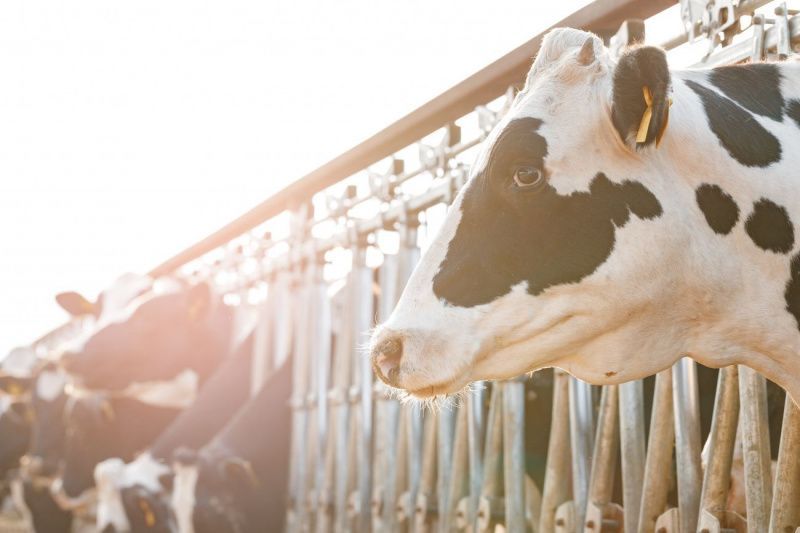The Mexican dairy industry:Technological Innovation Boosts the Dairy Industry
Sourse: mx.edairynews.com
The Mexican dairy industry, a crucial sector in the national economy, faces challenges but embraces technological innovations for growth.

The Mexican dairy industry plays a crucial role in the national economy, positioning itself as one of the major agricultural sectors in the country. However, it faces significant challenges such as rising costs, the need for sustainability, and competition in international markets. In this context, technological innovations have become indispensable allies in transforming processes, improving product quality, and optimizing production.
Current Outlook of the Dairy Industry in Mexico Mexico ranks among the top milk producers in Latin America, with an annual output of approximately 13.5 billion liters in 2024, according to data from the Ministry of Agriculture and Rural Development (SADER). The sector's challenges include increasing production costs due to inflation and input prices, and the need for more sustainable processes to reduce the environmental footprint. Despite these hurdles, the dairy industry has shown resilience by adopting technologies that enhance efficiency and ensure quality.
Key Technologies in Dairy Production The integration of sensors and connected devices allows producers to monitor cattle health, feed consumption, and milk quality in real-time. For instance, monitoring sensors that measure cattle body temperature and activity can alert producers to potential diseases, increasing productivity and reducing losses from undetected illnesses. Automation and Robotics The introduction of milking robots has revolutionized production, enhancing efficiency and reducing stress on livestock. For example, milking robots like the Lely Astronaut optimize the milking process and collect data on each cow, improving herd management. This leads to increased daily production per cow and reduced labor costs.
Artificial Intelligence (AI) AI is being used to analyze large data volumes, predict consumption patterns, and optimize inventory. For instance, Nestlé Mexico employs predictive analytics to adjust production according to market trends, thereby minimizing waste. Additionally, blockchain technology ensures transparency in the supply chain, allowing each liter of milk to be traced back to its origin. Grupo Lala's implementation of blockchain for enhanced traceability assures consumers that products meet quality standards.
Innovations for Improving Quality and Safety in Dairy Products Advanced pasteurization methods allow for the retention of essential nutrients while eliminating harmful bacteria, improving nutritional quality and prolonging product shelf life. Ultrafiltration systems utilize membranes to filter out contaminants and bacteria, resulting in purer and safer milk. Adoption of these technologies in Mexican dairy cooperatives has enabled them to meet stringent international market standards, such as those in Europe.
Sustainability and Energy Efficiency in the Dairy Industry Renewable energy sources like solar panels and biogas are reducing energy costs and improving sustainability on dairy farms. In Jalisco, producers are adopting biogas systems to generate energy from animal waste. A report from Research and Markets forecasts that the functional dairy market will grow at a compound annual rate of 8.2% between 2023 and 2028. Technological advancements are setting the stage for Mexico's dairy sector to overcome current challenges and exploit new opportunities, ensuring a robust future for the industry.
Current Outlook of the Dairy Industry in Mexico Mexico ranks among the top milk producers in Latin America, with an annual output of approximately 13.5 billion liters in 2024, according to data from the Ministry of Agriculture and Rural Development (SADER). The sector's challenges include increasing production costs due to inflation and input prices, and the need for more sustainable processes to reduce the environmental footprint. Despite these hurdles, the dairy industry has shown resilience by adopting technologies that enhance efficiency and ensure quality.
Key Technologies in Dairy Production The integration of sensors and connected devices allows producers to monitor cattle health, feed consumption, and milk quality in real-time. For instance, monitoring sensors that measure cattle body temperature and activity can alert producers to potential diseases, increasing productivity and reducing losses from undetected illnesses. Automation and Robotics The introduction of milking robots has revolutionized production, enhancing efficiency and reducing stress on livestock. For example, milking robots like the Lely Astronaut optimize the milking process and collect data on each cow, improving herd management. This leads to increased daily production per cow and reduced labor costs.
Artificial Intelligence (AI) AI is being used to analyze large data volumes, predict consumption patterns, and optimize inventory. For instance, Nestlé Mexico employs predictive analytics to adjust production according to market trends, thereby minimizing waste. Additionally, blockchain technology ensures transparency in the supply chain, allowing each liter of milk to be traced back to its origin. Grupo Lala's implementation of blockchain for enhanced traceability assures consumers that products meet quality standards.
Innovations for Improving Quality and Safety in Dairy Products Advanced pasteurization methods allow for the retention of essential nutrients while eliminating harmful bacteria, improving nutritional quality and prolonging product shelf life. Ultrafiltration systems utilize membranes to filter out contaminants and bacteria, resulting in purer and safer milk. Adoption of these technologies in Mexican dairy cooperatives has enabled them to meet stringent international market standards, such as those in Europe.
Sustainability and Energy Efficiency in the Dairy Industry Renewable energy sources like solar panels and biogas are reducing energy costs and improving sustainability on dairy farms. In Jalisco, producers are adopting biogas systems to generate energy from animal waste. A report from Research and Markets forecasts that the functional dairy market will grow at a compound annual rate of 8.2% between 2023 and 2028. Technological advancements are setting the stage for Mexico's dairy sector to overcome current challenges and exploit new opportunities, ensuring a robust future for the industry.
Key News of the Week










